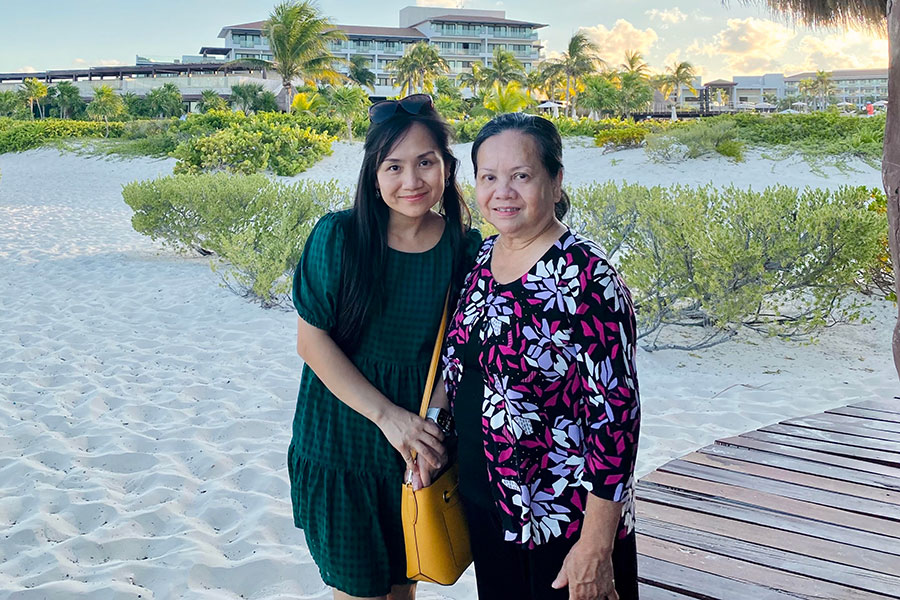PhD candidate’s fellowship is creating path to help others

Jan. 19, 2024 – DENTON –Thuy-Tien Ho has many life and death stories. As a neurocritical care physician assistant in a neuroscience intensive care unit, she treats patients with life-threatening conditions daily. She has a hard time forgetting some of the faces that have come through the ICU doors.
There was the time a middle-aged man with untreated hypertension was found unresponsive. He arrived at the hospital in a coma, having suffered a large unsurvivable brain hemorrhage. Then, there was the grandmother with risk factors for stroke who wanted to see her grandchildren graduate.
And then there was the man who sustained a stroke leaving him unable to talk or move his arm and leg. He considered himself to be previously fit and healthy with no known medical conditions, but investigations revealed that he had severe diabetes.
“These aren’t stories; they are actual cases,” Ho said. “We do everything we can do but even with advanced & innovative medicine, the outcome is sometimes less than desirable. Yet, more than 80% of strokes are preventable if the modifiable risk factors are controlled.”
She began to think about how she could help people before they came into the ICU.
Ho looked at public health PhD programs and found the perfect fit at Texas Woman’s School of Health Promotion and Kinesiology and its PhD in Health Studies. She loved being a physician assistant and one of the things that stood out about TWU was that she could control her own pace so she could continue to work full time.
While the PhD program is teaching her the theoretical side of preventive health, the Albert Schweitzer Fellowship program is giving her an opportunity to be physically present in the community, enacting health prevention. Ho was chosen as a 2023-24 Dallas-Fort Worth Albert Schweitzer Fellow, which prepares the next generation of professionals who will serve and empower vulnerable people to live healthier lives and create healthier communities.

“The Schweitzer Fellowship program has given me an awesome opportunity,” Ho said. “I look at the fellowship as my very first thing to develop and a way to put everything I have learned together. I’m excited to be able to go into the community and carry out the process and hopefully see an outcome I have directly contributed to.”
Ho is developing and implementing a mindfulness health promotion and chronic disease prevention program tailored to the needs of women living in West Dallas. The program specifically serves to educate women about healthy eating, increased physical activity and awareness of health and mental well-being, accommodating for the individual’s socioeconomic status and social determinants of health.
Ho is partnering with Brother Bill’s Helping Hand, a nonprofit organization which ministers to the Dallas community by ensuring the essentials of life, empowering through learning, and enriching relationships through faith, family, fitness and finance.
“I love them because they focus on the whole person,” Ho said. “They have bible study, a grocery store, a clinic, cooking classes, Zumba and more.”
Three years ago, Ho began volunteering with the nonprofit after seeing information when she was invited to be a guest speaker on a health topic for the Pathway Job Training & Empowerment Program. During the eight-week program that teaches women the skills necessary to find and keep a job, Ho holds 30-minute health talks about setting up a healthy lifestyle.
“The sessions are never 30 minutes; there are always questions,” Ho said. “People have so many questions about diet/nutrition, weight loss, diabetes, high blood pressure and overall health.”
Ho saw an opportunity to expand that group session into one-on-one health promotion education interventions. She applied for the Schweitzer Fellowship so that she could have more guidance in turning that idea into reality.
Since receiving the fellowship, Ho spent several months recruiting and setting up the sessions and recently started meetings with several female clients. In the one-on-one sessions, clients can talk about anything they want to within the realm of diet and physical activity and preventing chronic health conditions. Ho brings up goals they may want to set, their motivation and barriers that may deter them.
“I want my clients to figure out what works for them to stay healthy,” Ho said. “My goal is to have them change their behavior in a way that they are able to maintain that behavior and eventually improve their health.”
One of the women she is working with reminds her of her own mother. Ho came to the United States with her family from Vietnam when she was 10. Her mother didn’t speak a lot of English and had health issues which remained unrecognized until she was admitted to the hospital with uncontrolled high blood pressure. Following a doctor’s visit, she came home with pills for blood pressure and cholesterol after being told she had to take them or face death. Compliance was an issue for her mother without knowing the why and the how.
It wasn’t until Ho went to PA school that she could explain to her mother the seriousness of hypertension and why it was so important to take the pills. Her mother was motivated to take the pills because she wanted to see Ho graduate and spend time with her grandchildren. That mindfulness behavior is what Ho is trying to instill in her clients.
“This project is a stepping stone,” Ho said. “My ultimate goal is to finish my PhD and be more involved in developing and implementing community outreach projects in the realm of health promotion and disease prevention in underserved communities, while still working as a neurocritical care physician assistant.”
Since TWU joined the DFW chapter in 2015, one graduate student has participated in the Schweitzer Fellowship each year.
Media Contact
Amy Ruggini
Digital Content Manager
940-898-3628
aruggini@twu.edu
Page last updated 11:36 AM, May 30, 2024